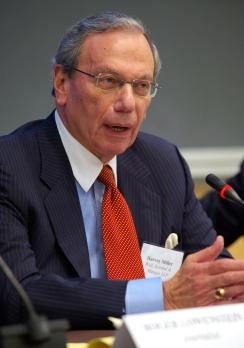Sixth Annual Deals Roundtable
VIDEO
Harvey Miller ’59, a bankruptcy lawyer with Weil, Gotshal & Manges LLP, asserts that billions of dollars were lost overnight because bankruptcy laws no longer provide cover for financial institutions, such as his client, Lehman Bros., which at one time might have renegotiated debt and moved on.
View the full panel: "The Propriety and Perils of Bailing Out Failing Financial Institutions"
Press contact: Erin St. John Kelly [email protected]
Office 212-854-1787 Cell: 646-646-284-8549 Public Affairs 212-854-2650
November 24, 2008 (NEW YORK) – There was plenty of blame to affix, but little consensus as to who or what was its rightful owner as respected legal and financial minds debated the root causes and long-term affects of the current financial crisis. The deals roundtable, held November 14, was sponsored by The Charles E. Gerber Transactional Studies Program at Columbia Law School and Private Equity Program at Columbia Business School.
The afternoon panel ostensibly centered on the financial bailout, but nimbly veered into a panoply of related and contributing issues: razor-thin credit standards, highly leveraged buyout firms, compromised rating agencies, executive compensation, tougher capital requirements and, of course, greed.
Panelist Roger Lowenstein, the author of Buffet: The Making of an American Capitalist and a former journalist for the Wall Street Journal, recalled 1997 and 1998, when American banking investments in emerging markets such as Singapore unraveled.
Moderator Stephen Friedman ’62, a retired chairman of Goldman Sachs & Co. and current chairman of Stone Point Capital LLC and of the board of directors of the Federal Reserve Bank, put it more bluntly: “We are recidivists,” he said. No one disagreed.
Patterson acknowledged that there was “huge complacency that everybody shared” in causing the meltdown and conceded that “private activity needs some rules of the road,” but that was about as far as he would go. Instead he warned of a coming era of stringent regulations.
Patterson also called executive compensation schemes “very inflammatory” but said he does not think that they contributed to the excess leverage of the system. Nor does he think proposals for regulating hedge funds are a good idea. “As a practical matter, we now have to expect an onslaught of new rules and strictures, and I think the challenge is to view them individually and as rationally as possible. So in doing that I think it is important to ask just what we expect a particular regulation to achieve,” he said.
Rating agencies drew some especially tough criticism from all the panelists who collectively bemoaned the cozy financial relationship between company management and watchdog agencies such as Moody’s, Standard & Poor’s and Fitch. These agencies are supposed to provide independent assessment and measurements of relative credit risk but, according to most panelists, they did not act promptly enough to warn of the coming crisis or, worse, their independence was somehow compromised.
“It is a very fundamental, very simple economic truth that incentives work. Perverse incentives work also — they just happen to work perversely. People play the way they pay them,” said Friedman, the panel’s moderator. “What could be a more flagrant conflict than getting paid by the people who really like triple-A ratings? After a while you think even reasonably honest people are going to veer in that direction. So I think we have to get back to thinking fundamentally like business people about basics like that.”
None of the panelists expressed strong optimism about the ability of the incoming administration to effectively deal with the issues at hand.“If you look at the propensity of Congress in prior crises, the likely thing is you will have quick fixes which will be heavily influenced by every lobbyist on K Street that will be coming out there,” Friedman said.
Earlier in the day professor Edward Rock of the University of Pennsylvania Law School and Ronald Gilson, a professor at both Columbia Law and Columbia Business Schools, discussed “Picking Your Shareholders.” Following their talk Michael Weisbach of Ohio State University and Morten Sorensen of Columbia Business School discussed the findings of their report “Leverage and Pricing in Buyouts: An Empirical Analysis.”
Columbia Law School’s Merritt Fox, the Michael E. Patterson Professor of Law and NASDAQ Professor for Law and Economics of Capital Markets, gave the keynote address.
Lowenstein and Friedman said the markets — and financial institutions that guided them — fell victim to Winston Churchill’s age-old quote: Those that fail to learn from history, are doomed to repeat it.
Columbia Law School, founded in 1858, stands at the forefront of legal education and of the law in a global society. Columbia Law School joins traditional strengths in international and comparative law, constitutional law, administrative law, business law and human rights law with pioneering work in the areas of intellectual property, digital technology, sexuality and gender, and criminal law.
